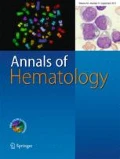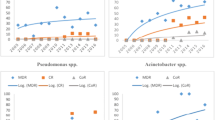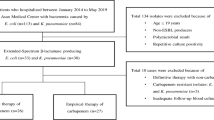Abstract
Escherichia coli and Klebsiella pneumoniae are main pathogens in neutropenic fever even if the proportion of Gram-positive cocci is increasing. Extended-spectrum β-lactamases (ESBL)-producing organisms are an emerging problem in nosocomial infection. Nevertheless, until now, information about risk factors for the acquisition and clinical outcomes of bacteremia due to ESBL-producing organisms is limited in neutropenic patients. From medical records collected between January 2007 and December 2008, we identified a total of 101 consecutive patients who developed bacteremia due to E. coli (n = 87) or K. pneumoniae (n = 14). Twenty-six (26 %) cases of bacteremia were caused by ESBL-producing organisms. A hospital stay of >2 weeks during the 3 months preceding bacteremia [adjusted odds ratio (OR), 5.887; 95 % confidence interval (CI), 1.572–22.041] and the use of broad-spectrum cephalosporins in the 4 weeks prior to bacteremia (adjusted OR, 6.186; 95 % CI, 1.616–23.683) were significantly related to the acquisition of ESBL. Twenty-four (92 %) of the ESBL-producing organisms were susceptible to either piperacillin–tazobactam or amikacin. Aminoglycosides (amikacin or isepamicin) were the main appropriate antimicrobial agents used against the ESBL-producing isolates during the initial empirical treatment (16/22, 73 %). However, the 30-day mortality rates for ESBL bacteremia and non-ESBL bacteremia were not significantly different (15 vs 5 %; p = 0.199). As alternatives to carbapenem, piperacillin–tazobactam plus amikacin or isepamicin combinations may be effective empirical therapeutic options for patients with neutropenic fever who are at high risk of developing bacteremia with ESBL-producing pathogens.

Similar content being viewed by others
References
Klastersky J, Ameye L, Maertens J, Georgala A, Muanza F, Aoun M, Ferrant A, Rapoport B, Rolston K, Paesmans M (2007) Bacteraemia in febrile neutropenic cancer patients. Int J Antimicrob Agents 30(Suppl 1):S51–S59
Madani TA (2000) Clinical infections and bloodstream isolates associated with fever in patients undergoing chemotherapy for acute myeloid leukemia. Infection 28:367–373
Norgaard M, Larsson H, Pedersen G, Schonheyder HC, Sorensen HT (2006) Risk of bacteraemia and mortality in patients with haematological malignancies. Clin Microbiol Infect 12:217–223
Collin BA, Leather HL, Wingard JR, Ramphal R (2001) Evolution, incidence, and susceptibility of bacterial bloodstream isolates from 519 bone marrow transplant patients. Clin Infect Dis 33:947–953
Park SH, Choi SM, Lee DG, Choi JH, Yoo JH, Lee JW, Min WS, Shin WS, Kim CC (2006) Current trends of infectious complications following hematopoietic stem cell transplantation in a single center. J Korean Med Sci 21:199–207
Kim SH, Kee SY, Lee DG, Choi SM, Park SH, Kwon JC, Eom KS, Kim YJ, Kim HJ, Lee S, Min CK, Kim DW, Choi JH, Yoo JH, Lee JW, Min WS (2012) Infectious complications following allogeneic stem cell transplantation: reduced-intensity vs. myeloablative conditioning regimens. Transpl Infect Dis. doi:10.1111/tid.12003
Freifeld AG, Bow EJ, Sepkowitz KA, Boeckh MJ, Ito JI, Mullen CA, Raad II, Rolston KV, Young JA, Wingard JR, Infectious Diseases Society of America (2011) Clinical practice guideline for the use of antimicrobial agents in neutropenic patients with cancer: 2010 update by the Infectious Diseases Society of America. Clin Infect Dis 52:e56–e93
Tumbarello M, Sanguinetti M, Montuori E, Trecarichi EM, Posteraro B, Fiori B, Citton R, D'Inzeo T, Fadda G, Cauda R, Spanu T (2007) Predictors of mortality in patients with bloodstream infections caused by extended-spectrum-β-lactamase-producing Enterobacteriaceae: importance of inadequate initial antimicrobial treatment. Antimicrob Agents Chemother 51:1987–1994
Rottier WC, Ammerlaan HS, Bonten MJ (2012) Effects of confounders and intermediates on the association of bacteraemia caused by extended-spectrum β-lactamase-producing Enterobacteriaceae and patient outcome: a meta-analysis. J Antimicrob Chemother 67:1311–1320
Bertz H, Auner HW, Weissinger F, Salwender HJ, Einsele H, Egerer G, Sandherr M, Schuttrumpf S, Sudhoff T, Maschmeyer G (2003) Antimicrobial therapy of febrile complications after high-dose chemo-/radiotherapy and autologous hematopoietic stem cell transplantation. Guidelines of the Infectious Diseases Working Party (AGIHO) of the German Society of Hematology and Oncology (DGHO). Ann Hematol 82(Suppl 2):S167–174
Lee DG, Choi SM, Choi JH, Yoo JH, Park YH, Kim YJ, Lee S, Min CK, Kim HJ, Kim DW, Lee JW, Min WS, Shin WS, Kim CC (2002) Selective bowel decontamination for the prevention of infection in acute myelogenous leukemia: a prospective randomized trial. Korean J Intern Med 17:38–44
Hughes WT, Armstrong D, Bodey GP, Bow EJ, Brown AE, Calandra T, Feld R, Pizzo PA, Rolston KV, Shenep JL, Young LS (2002) 2002 guidelines for the use of antimicrobial agents in neutropenic patients with cancer. Clin Infect Dis 34:730–751
Carbon C (1995) Overview of the efficacy of isepamicin in the adult core clinical trial programme. J Chemother 7(Suppl 2):79–85
Maraki S, Samonis G, Karageorgopoulos DE, Mavros MN, Kofteridis D, Falagas ME (2012) In vitro antimicrobial susceptibility to isepamicin of 6,296 Enterobacteriaceae clinical isolates collected at a tertiary care university hospital in Greece. Antimicrob Agents Chemother 56:3067–3073
Lee DG, Kim SH, Kim SY, Kim CJ, Park WB, Song YG, Choi JH (2011) Evidence-based guidelines for empirical therapy of neutropenic fever in Korea. Korean J Intern Med 26:220–252
Bekeris LG, Tworek JA, Walsh MK, Valenstein PN (2005) Trends in blood culture contamination: a College of American Pathologists Q-Tracks study of 356 institutions. Arch Pathol Lab Med 129:1222–1225
De Pauw B, Walsh TJ, Donnelly JP, Stevens DA, Edwards JE, Calandra T, Pappas PG, Maertens J, Lortholary O, Kauffman CA, Denning DW, Patterson TF, Maschmeyer G, Bille J, Dismukes WE, Herbrecht R, Hope WW, Kibbler CC, Kullberg BJ, Marr KA, Munoz P, Odds FC, Perfect JR, Restrepo A, Ruhnke M, Segal BH, Sobel JD, Sorrell TC, Viscoli C, Wingard JR, Zaoutis T, Bennett JE (2008) Revised definitions of invasive fungal disease from the European Organization for Research and Treatment of Cancer/Invasive Fungal Infections Cooperative Group and the National Institute of Allergy and Infectious Diseases Mycoses Study Group (EORTC/MSG) Consensus Group. Clin Infect Dis 46:1813–1821
Bone RC, Balk RA, Cerra FB, Dellinger RP, Fein AM, Knaus WA, Schein RM, Sibbald WJ (1992) Definitions for sepsis and organ failure and guidelines for the use of innovative therapies in sepsis. The ACCP/SCCM Consensus Conference Committee. American College of Chest Physicians/Society of Critical Care Medicine. Chest 101:1644–1655
Le Gall JR, Lemeshow S, Saulnier F (1993) A new Simplified Acute Physiology Score (SAPS II) based on a European/North American multicenter study. JAMA 270:2957–2963
Mermel LA, Allon M, Bouza E, Craven DE, Flynn P, O'Grady NP, Raad II, Rijnders BJ, Sherertz RJ, Warren DK (2009) Clinical practice guidelines for the diagnosis and management of intravascular catheter-related infection: 2009 Update by the Infectious Diseases Society of America. Clin Infect Dis 49:1–45
Rodriguez-Bano J, Navarro MD, Romero L, Muniain MA, de Cueto M, Rios MJ, Hernandez JR, Pascual A (2006) Bacteremia due to extended-spectrum β -lactamase-producing Escherichia coli in the CTX-M era: a new clinical challenge. Clin Infect Dis 43:1407–1414
Bull SB, Mak C, Greenwood CM (2002) A modified score function estimator for multinomial logistic regression in small samples. Comput Stat Data Anal 39:57
Gudiol C, Calatayud L, Garcia-Vidal C, Lora-Tamayo J, Cisnal M, Duarte R, Arnan M, Marin M, Carratala J, Gudiol F (2010) Bacteraemia due to extended-spectrum β-lactamase-producing Escherichia coli (ESBL-EC) in cancer patients: clinical features, risk factors, molecular epidemiology and outcome. J Antimicrob Chemother 65:333–341
Kang CI, Chung DR, Ko KS, Peck KR, Song JH (2012) Risk factors for infection and treatment outcome of extended-spectrum β-lactamase-producing Escherichia coli and Klebsiella pneumoniae bacteremia in patients with hematologic malignancy. Ann Hematol 91:115–121
Hyle EP, Bilker WB, Gasink LB, Lautenbach E (2007) Impact of different methods for describing the extent of prior antibiotic exposure on the association between antibiotic use and antibiotic-resistant infection. Infect Control Hosp Epidemiol 28:647–654
Hyle EP, Lipworth AD, Zaoutis TE, Nachamkin I, Fishman NO, Bilker WB, Mao X, Lautenbach E (2005) Risk factors for increasing multidrug resistance among extended-spectrum β-lactamase-producing Escherichia coli and Klebsiella species. Clin Infect Dis 40:1317–1324
Wener KM, Schechner V, Gold HS, Wright SB, Carmeli Y (2010) Treatment with fluoroquinolones or with β-lactam-β-lactamase inhibitor combinations is a risk factor for isolation of extended-spectrum-β-lactamase-producing Klebsiella species in hospitalized patients. Antimicrob Agents Chemother 54:2010–2016
Rodriguez-Bano J, Navarro MD, Romero L, Muniain MA, Cueto M, Galvez J, Perea EJ, Pascual A (2008) Risk-factors for emerging bloodstream infections caused by extended-spectrum β-lactamase-producing Escherichia coli. Clin Microbiol Infect 14:180–183
Chong Y, Yakushiji H, Ito Y, Kamimura T (2011) Clinical impact of fluoroquinolone prophylaxis in neutropenic patients with hematological malignancies. Int J Infect Dis 15:e277–e281
Trecarichi EM, Tumbarello M, Spanu T, Caira M, Fianchi L, Chiusolo P, Fadda G, Leone G, Cauda R, Pagano L (2009) Incidence and clinical impact of extended-spectrum-β-lactamase (ESBL) production and fluoroquinolone resistance in bloodstream infections caused by Escherichia coli in patients with hematological malignancies. J Infect 58:299–307
Pitout JD (2010) Infections with extended-spectrum β-lactamase-producing Enterobacteriaceae: changing epidemiology and drug treatment choices. Drugs 70:313–333
Peterson LR (2008) Antibiotic policy and prescribing strategies for therapy of extended-spectrum β-lactamase-producing Enterobacteriaceae: the role of piperacillin–tazobactam. Clin Microbiol Infect 14(Suppl 1):181–184
Kang CI, Park SY, Chung DR, Peck KR, Song JH (2012) Piperacillin–tazobactam as an initial empirical therapy of bacteremia caused by extended-spectrum β-lactamase-producing Escherichia coli and Klebsiella pneumoniae. J Infect 64:533–534
Vardakas KZ, Tansarli GS, Rafailidis PI, Falagas ME (2012) Carbapenems vs alternative antibiotics for the treatment of bacteraemia due to Enterobacteriaceae producing extended-spectrum β-lactamases: a systematic review and meta-analysis. J Antimicrob Chemother 67:2793–2803
Rodriguez-Bano J, Navarro MD, Retamar P, Picon E, Pascual A (2012) β-Lactam/β-lactam inhibitor combinations for the treatment of bacteremia due to extended-spectrum β-lactamase-producing Escherichia coli: a post hoc analysis of prospective cohorts. Clin Infect Dis 54:167–174
Falagas ME, Karageorgopoulos DE, Georgantzi GG, Sun C, Wang R, Rafailidis PI (2012) Susceptibility of Gram-negative bacteria to isepamicin: a systematic review. Expert Rev Anti Infect Ther 10:207–218
Livermore DM, Mushtaq S, Warner M, Zhang JC, Maharjan S, Doumith M, Woodford N (2011) Activity of aminoglycosides, including ACHN-490, against carbapenem-resistant Enterobacteriaceae isolates. J Antimicrob Chemother 66:48–53
Martinez JA, Cobos-Trigueros N, Soriano A, Almela M, Ortega M, Marco F, Pitart C, Sterzik H, Lopez J, Mensa J (2010) Influence of empiric therapy with a beta-lactam alone or combined with an aminoglycoside on prognosis of bacteremia due to gram-negative microorganisms. Antimicrob Agents Chemother 54:3590–3596
Schwaber MJ, Carmeli Y (2007) Mortality and delay in effective therapy associated with extended-spectrum β-lactamase production in Enterobacteriaceae bacteraemia: a systematic review and meta-analysis. J Antimicrob Chemother 60:913–920
Conflict of interest
The authors declare that they have no conflict of interest.
Author information
Authors and Affiliations
Corresponding author
Additional information
No external financial support was obtained for this study.
Rights and permissions
About this article
Cite this article
Kim, SH., Kwon, JC., Choi, SM. et al. Escherichia coli and Klebsiella pneumoniae bacteremia in patients with neutropenic fever: factors associated with extended-spectrum β-lactamase production and its impact on outcome. Ann Hematol 92, 533–541 (2013). https://doi.org/10.1007/s00277-012-1631-y
Received:
Accepted:
Published:
Issue Date:
DOI: https://doi.org/10.1007/s00277-012-1631-y




